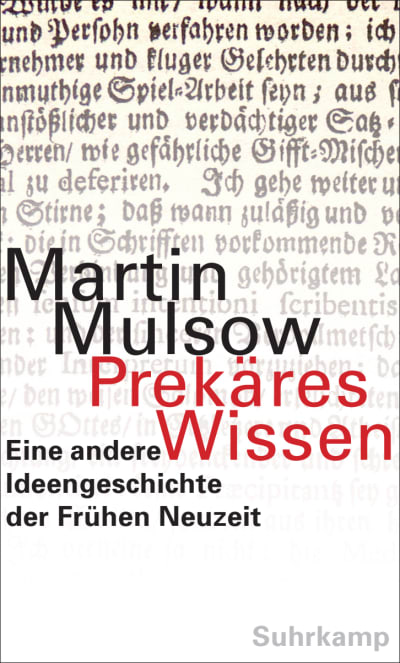Precarious Knowledge
The time has come to shine a light also on the precarious side: the uncertainty and jeopardising of some existing knowledge and theories, the tricky status of their carrier medium, the reaction to threat and loss, and the risk of heretical transfer. Martin Mulsow follows the trail of this precarious knowledge with the aim of re-establishing its significance for the process of the European history of knowledge. In case studies that are rich in material and encompass the period from the...
The time has come to shine a light also on the precarious side: the uncertainty and jeopardising of some existing knowledge and theories, the tricky status of their carrier medium, the reaction to threat and loss, and the risk of heretical transfer. Martin Mulsow follows the trail of this precarious knowledge with the aim of re-establishing its significance for the process of the European history of knowledge. In case studies that are rich in material and encompass the period from the Renaissance to the Enlightenment, he presents the tactics devised by intellectuals to be able to live with these perils, their gestures of retreat, their fears, but also what encouraged them, and their attempts to reclaim lost knowledge.
Precarious knowledge does not deal with the major themes of metaphysics and epistemology, but rather with those marginal zones such as magic and numismatics, interpretations of the Bible, and Orientalism. It is not only about theories, but also about fear and fascination, not about the major figures in research, but rather about those forgotten, or half-forgotten, scholars. It is a book full of exciting stories, a different history of ideas of the early modern period and simultaneously an ambitious attempt to rethink the very concept of knowledge against the background, too, of the “material turn”, the “iconic turn,” and within the history of communications and information.
»With great erudition Mulsow creates a kaleidoscope of the precariousness of knowledge in the pre-modern age, predominantly in the Holy Roman Empire ….« Daniel Jütte, Frankfurter Allgemeine Zeitung
»The fact that his book is a pleasure to read even in its capaciousness is down to the richness of the rarities, pictorial and written, unearthed from Northern German archives and explored with intellectual rigour and linguistic elegance.« Caspar Hirschi, Neue Zürcher Zeitung
»This is manna for experts - and yet this content-rich book is also a delight for the lay reader of history... Written with clarity and great enthusiasm for the subject, it lures the reader into the world of precarious, unfamiliar knowledge, research into which has only just begun.« Florian Welle, Süddeutsche Zeitung
»Mulsow's study based on a broad foundation of sources and literature gleams with its unconventional themes and linguistic elegance.« Wolfgang Hellmich, Zeitschrift für philosophische Forschung
»A fascinatingly different history of ideas from the early modern period that pays tribute to the 'strange facts' of outsiders without romanticising them.« Jutta Person, Philosophie Magazin
»Anyone interested in a history of thought beyond that of the usual well-trodden paths will glean much from reading Mulsow’s vividly written attempt to shed light also on the plentiful alternative routes and byways.« Catherine Newmark, Deutschland Rundfunk
»With great erudition Mulsow creates a kaleidoscope of the precariousness of knowledge in the pre-modern age, predominantly in the Holy Roman Empire ….« Daniel Jütte, Frankfurter Allgemeine Zeitung
»The fact that his book is a pleasure to read even in its capaciousness is down to the richness of the rarities, pictorial and written, unearthed from Northern German archives and explored with intellectual rigour and linguistic elegance.« Caspar Hirschi, Neue Zürcher...
Persons
Martin Mulsow
OTHER PUBLICATIONS

Overreaches
A doctor in Hamburg sets out on a search for Turkish battle drugs; three travellers to East India concoct an »unheard-of« elixir in a pharmacy on Java; Leibniz, the philosopher, tries to find the earliest Chinese scripts; Spaniards in Potosí, Peru, are forced to witness devil worship in the mines; a Jesuit missionary encounters an eastern Hermeticism in Isfahan; a heterodox...
